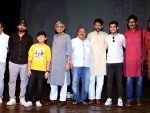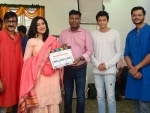
Did you ever meet Satyajit Ray in person?
Yes, if you can call them ‘meetings’ in a manner of speaking. The first time was indirectly through his photograph I saw in a magazine when I was only 12 years old. The second experience happened when I was a student of the National School of Drama in Delhi. The school was screening Ingmar Bergman’s Silences and Ray was seated right in front of me, his towering figure almost blocking my view. But it didn’t matter because I was more busy staring at his great back than watching the film. The third time was grounded in reality. Mirch Masala was part of the IIFI, Delhi. After the screening, he came to me and shook my hand. I was overawed.
Were you happy when you received this invitation?
Of course, and I consider it an honour and also a kind of poetic irony in that I never worked under him and here I am, asked to talk about what the phrase ‘honest actor’ means. Not having worked under Ray is one of the biggest regrets of my life.
Who, in your opinion, is an honest actor?
By its very nature, acting is being ‘false.’ So an ‘honest actor’ is a contradiction in terms. An actor can’t plagiarise like a writer can and he can’t improve on a grand performance. It has to be definite, certain and once for all. An honest actor is ‘a work in progress’. An actor is a messenger who is entrusted with the task of delivering the ‘goods’ honestly. There just can’t be a ‘dishonest’ actor.
To me, acting is not to pretend to disguise myself in order to emote but ‘to do.’ An actor is being dishonest when he considers himself to be more important than the work he is involved in. Having said that, I must also concede that when an actor becomes a star, he/she becomes self-indulgent and that is when dishonesty steps in. The actor/star fails to realise that his/her dishonesty benefits neither him/her nor the work he/ she is engaged in at any given point of time.
Is it right that you ran a workshop for the newcomers who worked with you in the Pakistani film Zinda Bhaag?
Yes, I was deeply touched by the script and was the only known actor in the entire acting cast. I ran a ten-day workshop for the new actors. My very first advice to a new actor is: go and look for the meaning of the word “act” in a dictionary. I can promise you, that it will surprise you, because it doesn’t mean speaking great dialogue, or wearing great costumes, anything of the sort. It has a very simple meaning. I explained to them that acting is not an end in itself: you don’t act for the sake of acting, you don’t act for showing off your abilities; you act for a purpose, and that purpose is to communicate a text to the audience. That’s more important than your own performance.
Has the cut-throat competition brought down the quality of acting and the honesty in an actor today?
There are conditions over which an actor has little or no control. How can one expect a person to be objective when he has to convey someone else’s ideas, concepts, ideologies? The audience can’t distinguish between real tears and glycerine-induced tears. Sometimes, for some actors, glycerine-induced tears can be more effective than natural tears. The blame should be squarely placed on people who are making films.
Why is this happening?
The minute the price of an actor begins to be determined by his ability to hold the audience captive, the star is born and acting becomes secondary. The current quality of actors’ output is abysmal. It’s only when the audience begins to demand fresh and new films might we begin to talk about an ‘honest’ approach. The refinement and the restraint we saw in films like Kagaz Ke Phool and Do Bigha Zameen is lost. I sincerely feel that some of the acting today can be described as ‘grotesque.’ But again, the poor quality of acting is a reflection of poor writing and the poor quality of vision around it.
You were deeply influenced by Geoffrey Kendall of Shakespeareana
When I was a student of St.Joseph's in Nainital, the Kendalls came with their touring theatre, Shakespeareana. Geoffrey Kendall encouraged me to take up acting. As a young boy I appreciated his acting ability: his mastery over his voice and intonation, his control of muscles, and his ability to instantly adopt the persona of Macbeth, Hamlet or King Lear. But, later on, I realised his true greatness lay somewhere else: his real mission was to communicate a text; all other activities were subservient to this main purpose — communicating a particular text to the audience. Then there was the great interaction with Ibrahim Alkazi when I was at the NSD.
Career favourites of your own performances?
There are just too many to recall after all these years. Shyam Benegal’s Manthan which brought me critical and public recognition. Govind Nihalani’s Aakrosh in which I portrayed a straightforward, committed lawyer is another favourite. The self-respecting, blind teacher in Sai Paranjpye's Sparsh , the drug addict in Robin Dharmaraj’s hard-hitting Chakra, the confused husband and father in Shekhar Kapoor’s Masoom, the role in Gautam Ghose’s Paar which made me shed more than five kilos. These films are unforgettable not so much for my work as for the films themselves. But I truly consider it an honour to be chosen by Gulzar Saab to play Mirza Ghalib in his bio-serial on the great poet.
How do you look back on some of your commercial films?
I never believed Tridev would run for a day. Yet, it prolonged my career by ten years. I am grateful to Rajiv Rai for this. The film gave me a box office hit I had never experienced before. Ten years later it gave me Mohra, again by Rajiv Rai. And ten years later it gave me The Dirty Picture. In fact, my dossier has more commercial films than all the art films I did put together. I worked in Mahesh Bhatt's Sir, Dharmesh Darshan's Lootere, Karma with Dilip Kumar and Bonny Kapoor's Rajkumar in which I did a double role. Today too, films like A Wednesday, Ishquiyan, and Dedh Ishquiyan are the kind of films one looks forward to.
Support Our Journalism
We cannot do without you.. your contribution supports unbiased journalism
IBNS is not driven by any ism- not wokeism, not racism, not skewed secularism, not hyper right-wing or left liberal ideals, nor by any hardline religious beliefs or hyper nationalism. We want to serve you good old objective news, as they are. We do not judge or preach. We let people decide for themselves. We only try to present factual and well-sourced news.






